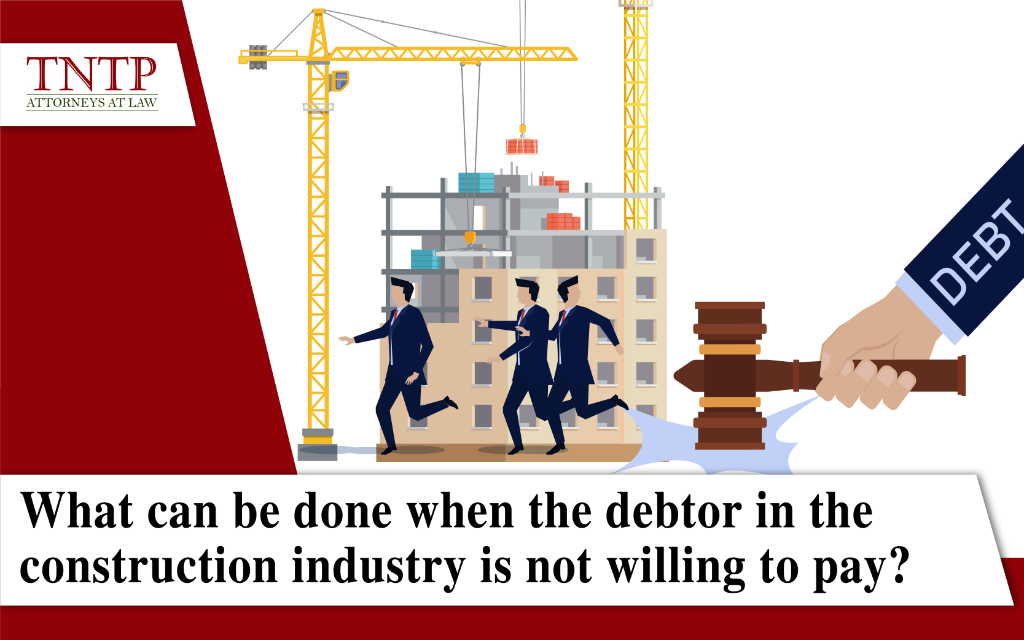In the operations of businesses, the occurrence of debts is almost unavoidable. Similar to other industries in society, the construction sector frequently experiences debt between parties at different stages of projects. In cases where the debtor is unwilling to pay the debt, what should a business do to protect its interests? In this article, TNTP’s lawyer will provide insights to address this question.
1. How is the lack of willingness to pay by the debtor typically manifested?
Usually, signs of the debtor’s unwillingness to pay become evident when the payment deadline arrives, and the debtor does not make voluntary payments. Alternatively, the debtor may not respond after being reminded by the business, or they might respond or make commitments but fail to follow through. In some cases, the debtor initially makes a payment but then becomes uncooperative and fails to settle the remaining debt. When any of these scenarios occur, the business should take necessary debt recovery measures because these actions indicate that the debtor is evading payment and not acting in good faith.
2. Tasks to Be Performed When the Debtor Is Unwilling to Pay the Debt
a) Sending a Payment Request Letter
Repeatedly requesting payment from the debtor through phone calls or emails holds less weight compared to sending an official payment request letter as a business to the debtor’s headquarters. The content of the payment request letter should include the debt details being requested for payment, the payment deadline or response time, and the potential actions that can be taken, such as legal proceedings if the debtor does not cooperate with the payment as specified in the letter. Therefore, sending this payment request letter can be considered a “final warning” to the debtor, signaling that more aggressive debt recovery measures will be pursued instead of mere negotiations.
The business should send the payment request letter promptly when the debtor shows signs of being unwilling to pay the debt. The maximum response time should be set at one month from the date of sending the letter to minimize potential risks and to consider initiating legal action as early as possible to ensure a higher chance of successful debt recovery.
b) Initiating Legal Proceedings at the Competent Dispute Resolution Authority
According to legal regulations, businesses have the right to file lawsuits with civil dispute resolution authorities to settle disputes in civil matters. Therefore, since the occurrence of debt between a business and a debtor in the construction industry is a dispute arising in civil matters, it will be resolved by competent courts and commercial arbitration centers. Specifically:
• Initiating Lawsuits at the Commercial Arbitration Center
The choice of an appropriate dispute resolution authority for debt recovery depends on the content of the contract or agreements between the parties. Specifically, to initiate a lawsuit at the Commercial Arbitration Center, the parties must have an arbitration agreement in the contract that specifies the selection of the Commercial Arbitration Center for dispute resolution if disputes arise during the contract’s execution (“referred to as the arbitration agreement”). Without an arbitration agreement in the contract, it is not possible to initiate a lawsuit at the Commercial Arbitration Center.
Once the Commercial Arbitration Center resolves the case and accepts the business’s lawsuit request, the center will issue an arbitration award compelling the debtor to pay the debt and fulfill other obligations to the business.
• Initiating Lawsuits at the Competent Court
Initiating lawsuits in a competent court is simpler. If the contract or agreements between the parties do not include an arbitration agreement, the dispute resolution authority will be the competent court. Initiating lawsuits in the competent court is carried out according to the provisions of the Civil Procedure Code, whereby the business must accurately determine the competent court. Otherwise, the business’s lawsuit application may be rejected by the court.
After the competent court completes the trial process and the verdict becomes legally effective, the business can proceed to file an application for judgment enforcement with the competent authority to request legal measures necessary for debt recovery. The judgment enforcement authority acts on behalf of the state’s authority to carry out necessary legal measures to ensure that the debtor is compelled to pay the debt.
This article by TNTP’s lawyers addresses the topic: ” What can be done when the debtor in the construction industry is not willing to pay?” It is hoped that this article is helpful to readers.
Best Regard,







